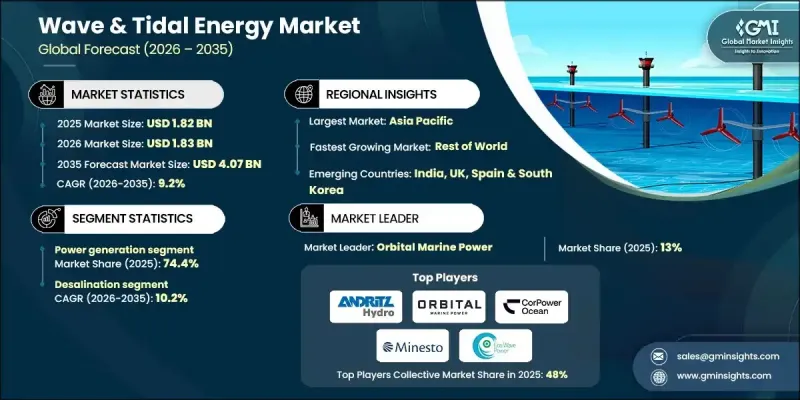
|
市場調査レポート
商品コード
1928933
波力・潮力エネルギーの市場機会、成長要因、業界動向分析、および2026年から2035年までの予測Wave and Tidal Energy Market Opportunity, Growth Drivers, Industry Trend Analysis, and Forecast 2026 - 2035 |
||||||
カスタマイズ可能
|
|||||||
| 波力・潮力エネルギーの市場機会、成長要因、業界動向分析、および2026年から2035年までの予測 |
|
出版日: 2026年01月12日
発行: Global Market Insights Inc.
ページ情報: 英文 111 Pages
納期: 2~3営業日
|
概要
世界の波力・潮力エネルギー市場は、2025年に18億2,000万米ドルと評価され、2035年までにCAGR9.2%で成長し、40億7,000万米ドルに達すると予測されております。

市場拡大は、改良されたエネルギー変換システム、先進的な導入手法、耐久性と性能を向上させる次世代材料の使用など、海洋エネルギー技術の継続的な進歩によって支えられています。これらの開発は、システム効率を向上させながら運用コストの削減に貢献しており、海洋ベースの再生可能エネルギーの商業利用をますます現実的なものにしています。波力および潮力エネルギーは、自然の海洋運動から生成されます。波力システムは水面運動を利用し、潮力システムは天文力によって駆動される安定した水中潮流を捕捉します。これらのエネルギー源は、排出量が極めて少なく、クリーンで予測可能な電力を供給するため、世界の持続可能性と脱炭素化の目標に密接に沿っています。構造化された金融プログラムを通じた強力な公的資金支援は、業界の信頼感を高め、実証プロジェクトを可能にし、拡張可能な導入を支援しています。政策枠組みと長期的なエネルギー計画は、波力・潮力技術の採用をさらに促進し、世界の再生可能エネルギーポートフォリオにおいてますます重要な位置づけを確立しています。
| 市場範囲 | |
|---|---|
| 開始年 | 2025年 |
| 予測年度 | 2026-2035 |
| 開始時価値 | 18億2,000万米ドル |
| 予測金額 | 40億7,000万米ドル |
| CAGR | 9.2% |
発電セグメントは2025年に74.4%のシェアを占め、2035年までCAGR9.1%で成長すると予測されています。排出削減とエネルギー多様化への取り組みの高まりが、安定した出力を提供し他の再生可能エネルギー源を補完する海洋発電の需要を牽引しています。
北米の波力・潮力エネルギー市場は2025年に7,620万米ドルに達しました。地域的な成長は、クリーンエネルギーインフラの強化と沿岸地域における商業化の加速を目的とした、有利な規制枠組みと公共投資の増加によって支えられています。
よくあるご質問
目次
第1章 調査手法と範囲
第2章 エグゼクティブサマリー
第3章 業界考察
- 業界のエコシステム
- 原材料の入手可能性と調達分析
- 製造能力評価
- サプライチェーンの回復力とリスク要因
- 流通ネットワーク分析
- 規制情勢
- 業界への影響要因
- 促進要因
- 業界の潜在的リスク&課題
- 成長可能性分析
- コスト構造分析
- ポーターの分析
- 供給企業の交渉力
- 買い手の交渉力
- 新規参入業者の脅威
- 代替品の脅威
- PESTEL分析
- 新たな機会と動向
- デジタル化とIoT統合
- 新興市場への進出
- 投資分析と将来展望
第4章 競合情勢
- イントロダクション
- 企業の市場シェア分析:地域別
- 北米
- 欧州
- アジア太平洋地域
- 世界のその他の地域
- 戦略的ダッシュボード
- 戦略的取り組み
- 企業ベンチマーキング
- イノベーションと技術動向
第5章 市場規模・予測:用途別、2022-2035
- 発電
- 海水淡水化
- その他
第6章 市場規模・予測:地域別、2022-2035
- 北米
- 米国
- カナダ
- 欧州
- フランス
- スペイン
- 英国
- ノルウェー
- アジア太平洋地域
- 中国
- インド
- 韓国
- 世界のその他の地域
第7章 企業プロファイル
- Andritz Hydro
- AquaWave &Tidal Power
- BioPower Systems
- Carnegie Clean Energy
- CorPower Ocean
- Eco Wave Power Global
- INGINE
- Inyanga Marine Energy Group
- Minesto
- Mocean Energy
- Nova Innovations
- Novige
- Ocean Energy Systems
- Ocean Renewable Power Company
- Orbital Marine Power
- Oscilla Power
- SINN Power
- SSE Renewables
- Voltai
- Wave Swell Energy
- Wavepiston


